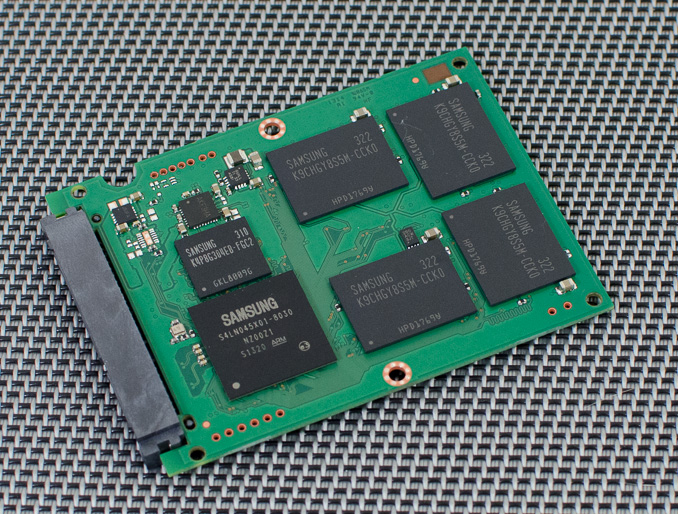Samsung SSD 840 EVO Review: 120GB, 250GB, 500GB, 750GB & 1TB Models Tested
by Anand Lal Shimpi on July 25, 2013 1:53 PM EST- Posted in
- Storage
- SSDs
- Samsung
- TLC
- Samsung SSD 840
Final Words
I was extremely excited about Crucial's M500 because it was the first reasonably priced ~1TB SSD. Even though its performance wasn't class leading, it was honestly good enough to make the recommendation a no-brainer. The inclusion of features like eDrive support were just the icing on the cake. With the EVO, Samsung puts forth a formidable competitor to the M500. It's faster, uses less power at idle and carries lower MSRPs for most of the capacity range. Microsoft's eDrive standard isn't supported at launch, but Samsung expects to change that via a firmware update this September.
Endurance isn't a concern with TLC for client workloads, although I wouldn't recommend deploying the EVO in a write heavy database server or anything like that.
The additional features that Samsung threw in the pot this round really show some innovative thinking. TurboWrite does a good job of blurring the lines between MLC and TLC performance, while Samsung's RAPID DRAM cache offers adventurous users a way of getting a taste of high-end PCIe SSD performance out of an affordable TLC SATA drive.
The 1TB version is exciting because it offers a competitive price with the 960GB M500 but with better performance. It's also good to have an alternative there as the 960GB M500 has been supply constrained at times. At first I didn't believe that Samsung's TLC strategy could hold weight against the Intel/Micron approach of aggressively pursuing smaller process nodes with MLC NAND, but the EVO does a lot to change my opinion. I'd have no issues with one of these drives in my system even as primary storage. The performance story is really good (particularly with the larger capacities), performance consistency out of the box is ok (and gets better if you can leave more free space on the drive) and you've got Samsung's firmware expertise supporting you along the way as well.

To say that I really like the EVO is an understatement. If Samsung can keep quantities of the 840 EVO flowing, and keep prices at or below its MSRP, it'll be a real winner and probably my pick for best mainstream SSD.











137 Comments
View All Comments
Sivar - Thursday, July 25, 2013 - link
Really well-written article.I have to admit, while most of Samsung's products are crap, their 840 and later SSDs are not bad at all.
(The 830, while not prone to electronic failure, was built really poorly. It's SATA connector would snap off if you tilted your head the wrong way while looking at it).
Coup27 - Thursday, July 25, 2013 - link
Samsung have gotten into the world position they are in today by selling crap. I have used plenty of 830's and I have never had an issue with the SATA connector so I have no idea what you are doing with it.Coup27 - Thursday, July 25, 2013 - link
Haven't ^^ (why is there no edit button?)piroroadkill - Thursday, July 25, 2013 - link
So you accidentally broke a SATA connector, and now that's suddenly a flaw? I have two Samsung 830 256GB in my system, and somehow I didn't break the SATA connectors...I also fitted 4x Samsung 830 256GB to a server at work.. and somehow I didn't break the SATA connectors..
HisDivineOrder - Saturday, July 27, 2013 - link
True, this. SATA connectors are poorly designed, but that's the fault of the people who made the spec, not the specific one in the 830. I'm not saying it can't break. I've had SATA connectors break on a variety of devices. None of them were my 830, but I'm not saying it's impossible or whatever.I've seen WD, Seagate, and Hitachi drives all have a problem with the connector, though. Seems like SATA and HDMI were designed to make the connection as loose and easily broken as possible. I guess that gives them some small percentage of people buying all new product to replace something on said product that's small and plastic...
mmaenpaa - Thursday, July 25, 2013 - link
Good article once again Anand,and very good perfomance for this price range.
Regarding Torx, I believe this is one the main reasons why it is used:
"By design, Torx head screws resist cam-out better than Phillips head or slot head screws. Where Phillips heads were designed to cause the driver to cam out, to prevent overtightening, Torx heads were designed to prevent cam-out. The reason for this was the development of better torque-limiting automatic screwdrivers for use in factories. Rather than rely on the tool slipping out of the screw head when a torque level is reached, thereby risking damage to the driver tip, screw head and/or workpiece, the newer driver design achieves a desired torque consistently. The manufacturer claims this can increase tool bit life by ten times or more"
(from https://en.wikipedia.org/wiki/Torx)
BR,
Markku
hybrid2d4x4 - Thursday, July 25, 2013 - link
For what it's worth, my experience with screws is consistent with your post. I've never had a torx screw slip out, which is definitely not the case with philips or the square or flathead varieties. I'd like to see them used more often.piroroadkill - Thursday, July 25, 2013 - link
Agreed. I love Torx. Philips and pozidriv are the terrible bastard children of the screw universe. Always slipping and burring. Ugh. If everything was replaced with totally cam-out free designs like Torx, allen head, robertson screw.. etc, etc.. then I'd be more than happy.psuedonymous - Thursday, July 25, 2013 - link
I'd LOVE for Torx to be used more often. They're much easier to work with (not once have I had a Torx screw fall off the screwdriver and roll under the desk), the screwheads are more robust, and they frankly look a lot nicer than Philips or Pozidriv.It'd make pulling apart laptops all day a darn sight less onerous if Torx were the standard rather than Philips.
camramaan - Friday, February 14, 2014 - link
But then there would be less security in other areas of the mechanical world... not everyone can carry a bunch of Torx bits everywhere they go, so breaking into, or disassembling something built with Torx is more time laborious and pre-planned. I fully understand the sentiments, but the development of alternative screw heads was more for security than ease of use.